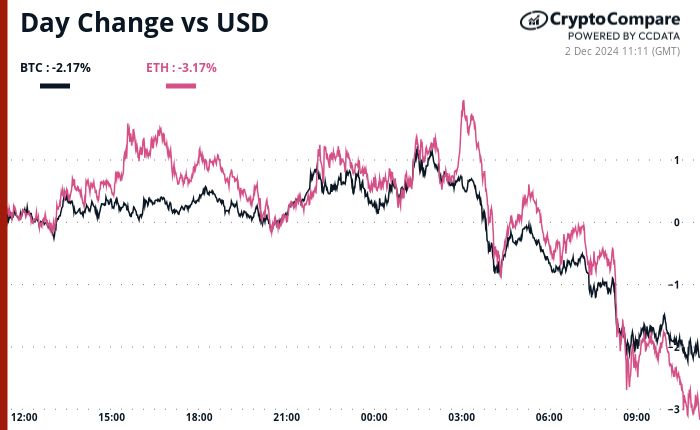Liquid staking giant Lido has come under fire after co-founder and chief technology officer Vasiliy Shapovalov said the hardware used to secure Ethereum should be professionally managed, infuriating an army of enthusiasts who operate such hardware at home, as well as several prominent Ethereum influencers.
Critics said Shapovalov’s comments were antithetical to the decentralized ethos of Ethereum.
“I’m going to be generous here and apply Hanlon’s razor – that [Lido] simply don’t get it,” Ben Edgington, the founder of an Ethereum 2.0 client at Consensys, tweeted, referring to the adage that one should “never attribute to malice that which is adequately explained by stupidity.”
“But it is getting increasingly hard,” he continued, “not to conclude that they are bad-faith actors.”
To participate in validating transactions on Ethereum, users must stake, or lock up, their Ether and continuously run specific software on their computers. This is called running a node. Users who do so are rewarded with a modest staking yield.
$42,000 Outlay
The capital required to run a node is prohibitive, however. At present, one must stake 32 ETH in order to run a single node — more than $42,000 at Monday’s prices.
The high barrier to entry created a market for companies like Lido, which allow users to stake and generate yield from any amount of ETH, no matter how small. Lido batches user deposits into 32 ETH chunks and gives the ETH to hand-picked node operators who run the software required to secure the blockchain.
Speaking last week during a panel at Devcon, Ethereum’s marquee conference, Shapovalov called users who run their own nodes at home “hobbyists” and said most of the staked Ether “should be managed by professional operators.”
“What we want is for Lido to be a pipeline from home staker to professional operator,” he explained. “Because honestly, most solo providers are not rational, they’re are not making a business out of it, they just do it for fun, which is great. But [if] they want to do it for a day job, they should have the ability to, like, earn their reputation, earn the metrics required to get into the set of big boys and grow up.”
Rocket Pool Users Fire Back
His comments drew a quick rebuke from some prominent Ethereans. But the most fierce criticism came from users of Rocket Pool, a competing decentralized liquid staking protocol. Unlike Lido, Rocket Pool allows anyone to run a node as long as they can put up 16 ETH, encouraging at-home use.
“I have already broken even on cost overall,” a Rocket Pool node operator wrote. “I spend 10 mins a week maintaining the node. This is easy AF.”
Darren Langley, general manager at Rocket Pool, told The Defiant that hobbyists, rather than professionals, are the likeliest to contribute to the resiliency of Ethereum.
“If you’re a business, your sole purpose for being is to generate profit. It’s not to secure [Ethereum]. That’s a byproduct, but it’s not what you’re designed to do,” he said. “As a home staker, you may do it for fun, but I would certainly say that you are much more passionate than most businesses. … And a lot of people do make a decent amount of profit from [home] staking.”
In an interview with The Defiant a day after his comment, Shapovalov doubled down.
“It’s mostly nonsense,” he said of the criticism. “There are many kinds of resiliency. And there is a resiliency in wide distribution, but there is also resiliency in being committed to a business. People who run nodes for fun will drop them…when it’s no longer fun…If your business [and] career depends on blockchains, you tend to be thoughtful and committed.”
But he later walked back his comments and offered an olive branch to small operators, noting that Edgington’s criticism “cut deep.”
Solo Stakers
“I’m feeling very acutely that Lido should have delivered the right design to get solo stakers in by now, but we haven’t delivered it yet,” he wrote on Twitter. “It is, however, absolutely at the core of the vision for Lido.”
Rocket Pool’s model, in which node operators put up, or “bond,” 16 ETH and receive the other 16 from the protocol’s users, would not work at scale, he said.
“The pool of people who have the chops and time to maintain the node + are willing to lock up what’s essentially a fortune in most parts of the world, I reckon, [is] nearly fully exhausted,” he wrote.
Langley conceded Shapovalov’s point concerning bonded staking but said it would soon be moot.
“That is fair,” he told The Defiant. “The way that we [at Rocket Pool] look at it is, that you do need a bond. It’s essential. Because proof of stake is called proof of stake for a reason. Something has to be at stake. … But, at the same time, that bond doesn’t have to be as big as it is today.”
Lower Entry Requirement
In an update scheduled for the end of this year, Rocket Pool will lower the minimum bond amount from 16 ETH to 8 ETH, or almost $11,000 at Monday’s prices. At an undetermined later date, Rocket Pool hopes to halve the requirement again, to 4 ETH. (The latter would require a hoped-for change to Ethereum itself, Langley said.)
The Ethereum website calls home staking the “gold standard,” as it “strengthen[s] the robustness, decentralization, and security of the Ethereum protocol.”
Edgington said that makes home staking the most economically rational choice long-term.
“We understand that without an army of solo stakers the value of Ethereum is basically zero,” he wrote.
Ether is up 2.6% in the past 24 hours.
ETH Price, Source: The Defiant Terminal
Read More: thedefiant.io









 Bitcoin
Bitcoin  Ethereum
Ethereum  XRP
XRP  Tether
Tether  Solana
Solana  Dogecoin
Dogecoin  Cardano
Cardano  USDC
USDC  Lido Staked Ether
Lido Staked Ether  Avalanche
Avalanche  TRON
TRON  Shiba Inu
Shiba Inu  Toncoin
Toncoin  Stellar
Stellar  Chainlink
Chainlink  Wrapped stETH
Wrapped stETH  Polkadot
Polkadot  Wrapped Bitcoin
Wrapped Bitcoin  Hedera
Hedera  Bitcoin Cash
Bitcoin Cash  WETH
WETH  Litecoin
Litecoin  Sui
Sui  NEAR Protocol
NEAR Protocol  Pepe
Pepe  Uniswap
Uniswap  LEO Token
LEO Token  Aptos
Aptos  Wrapped eETH
Wrapped eETH  Internet Computer
Internet Computer  USDS
USDS  POL (ex-MATIC)
POL (ex-MATIC)  Ethereum Classic
Ethereum Classic  Cronos
Cronos  Artificial Superintelligence Alliance
Artificial Superintelligence Alliance  Ethena USDe
Ethena USDe  Filecoin
Filecoin  Render
Render  Bittensor
Bittensor  Arbitrum
Arbitrum  Algorand
Algorand  Cosmos Hub
Cosmos Hub  Dai
Dai  Stacks
Stacks  Aave
Aave  Immutable
Immutable  WhiteBIT Coin
WhiteBIT Coin